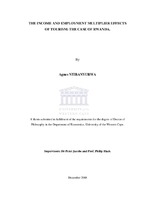A thesis submitted in fulfilment of the requirements for the degree of Doctor of Philosophy in the department of economics, university of the Western Cape
Abstract
The income and employment multiplier effects of tourism- The case of
Rwanda. A. NTIBANYURWA PhD Thesis, Department of Economics, University of the Western Cape. The growing popularity of developing countries as tourist destinations in recent years has stimulated a considerable body of research on the developmental benefits inherent in tourism. Developing countries have been attracting tourists mainly due to their natural resource endowments, considered a vital determinant in this newly-found source of their comparative advantage. After accounting for all the explicit and hidden costs linked to this natural resource-based tourism, the sustainable expansion of the tourism sector is claimed to be contributing substantially to economic growth. Studies to date have investigated the rising share of tourism in macroeconomic output, but have paid limited attention to the economic mechanisms through which tourism supposedly leads to broader development. This study seeks to contribute to filling this gap in our knowledge of the economic dynamics associated with tourism. More specifically, the goal is to shed light on the channels through which tourism contributes to economic growth and to derive tourism income and employment multipliers to estimate its developmental benefits for Rwanda. Our refined multipliers to capture the total effects of tourism to the economy confirm that through its powerful inter-sectoral linkages, tourism improves the economic wealth of many developing countries including Rwanda. Deeper analysis of the macroeconomic consequences of the expansion of the service sector however suggests that, under some conditions, this could exhibit “Dutch Disease” effects. Tourism generates substantial foreign earnings and its development is strongly correlated with the shrinkage of the traditional primary

